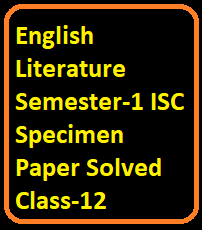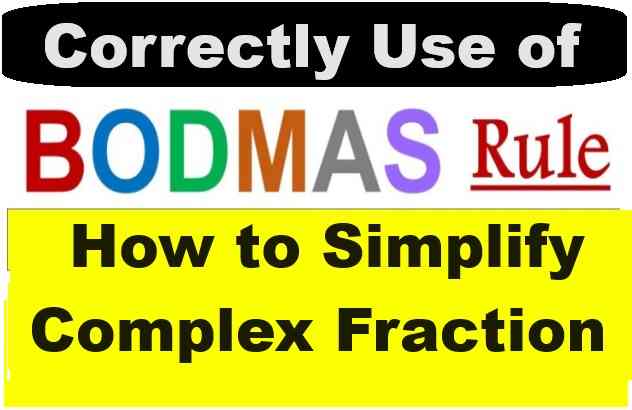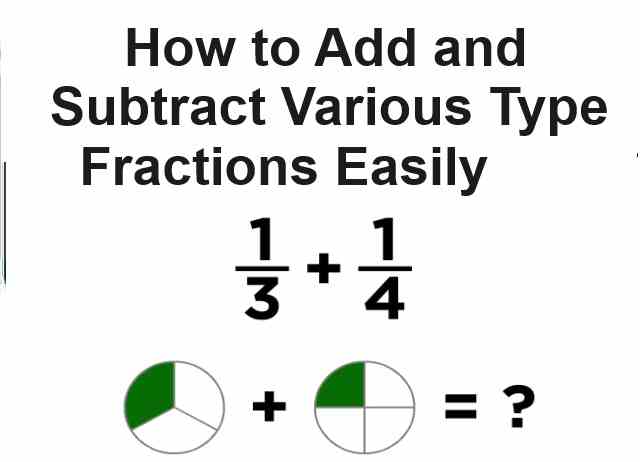English Literature Semester-1 ISC Specimen Paper Solved Class-12. Step by step solutions of ISC Class-12 specimen model sample paper . During solutions of semester-1 English Literature specimen paper we explain with figure , graph, table whenever necessary so that student can achieve their goal in next upcoming exam of council .
English Literature Semester-1 ISC Specimen Paper Solved Class-12
| Board | ISC |
| Class | 12th (XII) |
| Subject | English Literature Paper 2 |
| Topic | Semester-1 ISC Specimen Paper Solved |
| Syllabus | on bifurcated syllabus (after reduction) |
| session | 2021-22 |
| Question Type | MCQ/ Objective (as prescribe by council) |
| Total question |
Total- 8 with all parts |
| Max mark |
80 |
English Literature Semester-1 ISC Specimen Paper Solved Class-12
SECTION A- THE TEMPEST
Question-1 English Literature Semester-1 ISC Specimen
Choose the correct option given below each question.
(i) What is Ferdinand doing at the beginning of Act 3 Sc I?
a) Cursing Prospero
b) Gathering wood
c) Crying
d) Plotting to escape
Solution
b) Gathering wood
(ii) Why has Prospero given him this task?
a) To punish him.
b) To humiliate him.
c) To test his sincerity in love.
d) To take revenge.
Solution
c) To test his sincerity in love.
(iii) What is Ferdinand willing to become for Miranda?
a) King of Naples.
b) A patient log- man.
c) Marry her and become her husband.
d) To be Prospero’s slave for Miranda’s sake.
Solution
b) A patient log- man.
(iv) What does Ferdinand pray should happen if he speaks false?
a) A blight will fall on him
b) The Gods will be angry
c) His best aspirations may be inverted to mischief.
d) Miranda will marry someone else.
Solution
c) His best aspirations may be inverted to mischief.
(v) Ferdinand shares a Latin root word to describe Miranda in Act III Scene I. Which word does he use?
a) Beautiful
b) Admired
c) Dearest
d) Royal
Solution
b) Admired
(vi) What does Stephano mean when he says that Caliban has “drown’d his tongue in sack” in Act III Scene II?
a) He was drowned in a sack.
b) He had drunk so much that he could not speak.
c) He was lost in thought.
d) None of the above
Solution
b) He had drunk so much that he could not speak.
(vii) Which aspect of Caliban’s nature is revealed through his words, “bite him to death, I prithee”?
a) Savagery
b) Uncivilised
c) Roughness
d) All of the above
Solution
a) Savagery
(viii) Why does Gonzalo say, “I need must rest me” in Act III Scene III?
a) He is feeling sleepy.
b) He does not want to go with Antonio and Sebastian and Antonio.
c) He is exhausted.
d) He wants some time to look around the island.
Solution
c) He is exhausted.
(ix) To whom is Alonso referring in Act III Scene III, when he says, “he is drown’d”?
a) Prospero
b) Ferdinand
c) Adrian
d) Francisco
Solution
b) Ferdinand
(x) What do Antonio and Sebastian talk about while Alonso is resting in Act III Scene III?
a) About abandoning the King’s party
b) About making another attempt to murder Alonso.
c) About seizing the island for themselves.
d) None of the above.
Solution
b) About making another attempt to murder Alonso.
Question-2 English Literature Semester-1 ISC Specimen
Read the lines given below and choose the correct option given after each question.
A.
Miranda: I am a fool
To weep at what I am glad of
Prospero: Fair encounter
Of two most rare affections!
(i) To whom is Miranda speaking?
a) Prospero
b) Ferdinand
c) Ariel
d) Alonso
Solution
b) Ferdinand
(ii) Of what is Miranda glad?
a) Ferdinand reciprocates her love.
b) That she can leave the island.
c) That her father has not been able to find out about her love.
d) That she will be the queen of Naples.
Solution
a) Ferdinand reciprocates her love.
(iii) What do her words reveal about her?
a) She is simple.
b) She is ambitious.
c) She is humble.
d) She is compassionate.
Solution
d) She is compassionate.
(iv) What is Prospero’s reaction to her happiness?
a) He is angry with his daughter for not following his commands.
b) He is happy with her.
c) He decides to punish her for confessing her love to Ferdinand.
d) He decides to put obstacles in the way of her love.
Solution
b) He is happy with her.
(v) Which of the following statements is NOT TRUE about Miranda in the context of the quoted lines?
a) She respects her father.
b) She has a streak of independence in her.
c) She is conniving
d) She has a soft heart.
Solution
c) She is conniving
(vi) What does Prospero mean by “rare affections”?
a) Interesting persons
b) Pure souls
c) Unusual emotions
d) Foolish sentiments
Solution
b) Pure souls
(vii) For what does Prospero go on to ask heaven’s blessings?
a) For the love that is growing between the young couple.
b) For Ferdinand having come to the island.
c) For Miranda being so biddable.
d) For his efforts on their behalf, to unite the two lovers.
Solution
a) For the love that is growing between the young couple.
(viii) What does Miranda ask Ferdinand at the end of the scene?
a) She asks him to make her his wife.
b) She asks him to take her to Naples.
c) She asks him to take her away from her father.
d) She asks him to finish his task.
Solution
a) She asks him to make her his wife.
(ix) What evidence do we have of Ferdinand’s love for Miranda?
a) He is willing to do the humble task for her in spite of being a Prince.
b) He is willing to elope with her.
c) He is willing to make her his wife against.
d) He shows the courage to fight Prospero for Miranda’s sake.
Solution
a) He is willing to do the humble task for her in spite of being a Prince.
(x) When do the two plan to meet again?
a) The next day
b) That evening
c) Half an hour later
d) They decide to be together.
Solution
c) Half an hour later
B.
Antonio: I’ll believe both
And what else does want credit, come to me,
(i) What has Antonio just seen?
a) Ariel singing a song.
b) Ariel in the shape of a sea nymph.
c) Strange shapes bringing in a banquet.
d) The fact that their clothes are fresh even after the shipwreck.
Solution
c) Strange shapes bringing in a banquet.
(ii) What is Antonio’s attitude in these lines?
a) Pleasure
b) Fear
c) Surprise
d) Scepticism
Solution
a) Pleasure
(iii) What does Antonio refer to as “both”?
a) Ferdinand and Miranda.
b) Unicorns and the Phoenix.
c) Ariel and Caliban.
d) Nymphs and Satyrs.
Solution
b) Unicorns and the Phoenix.
(iv) How does Gonzalo interpret the sight he has just seen?
a) He feels that they are agents of punishment.
b) He feels that they are islanders.
c) He thinks he has seen a vision.
d) He thinks that his eyes are playing tricks with him.
Solution
b) He feels that they are islanders.
(v) Who is listening to their conversation?
a) Ariel
b) Caliban
c) Prospero
d) Ferdinand
Solution
c) Prospero
(vi) Alonso refers to the “dumb discourse” of the creatures. What does he refer to by these words?
a) The signs made by the creatures.
b) The dances of the creatures.
c) The frightening gestures made by the creatures.
d) Their pleasant faces.
Solution
a) The signs made by the creatures.
(vii)What did the strange creatures bring for Alonso and his group?
a) Flowers
b) Viands
c) Wine
d) Stones
Solution
b) Viands
(viii) Why does Gonzalo say that Alonso need not fear?
a) In their youth they had heard tales of strange people.
b) There are many kinds of people inhabiting the earth.
c) Since the island is a strange place, they should expect strange things here.
d) None of the above
Solution
a) In their youth they had heard tales of strange people.
(ix) Why can’t the king and his group eat the food brought in?
a) They realise that the food is poisoned.
b) They find their hunger disappearing.
c) Suddenly the food vanishes
d) They are warned against eating the food.
Solution
c) Suddenly the food vanishes
(x) What do you conclude about Gonzalo’s nature from his interaction with the others in the scene?
a) He is indifferent.
b) He is suspicious of everything
c) He always speaks against Antonio and Sebastian.
d) He tries to find good in everything.
Solution
d) He tries to find good in everything.
SECTION B
ECHOES- SHORT STORIES
Question-3 English Literature Semester-1 ISC Specimen
(i) In the short story, To Build a Fire, the protagonist travels alone. At what temperature is he warned against travelling alone?
a) Thirty-two degrees Fahrenheit
b) Zero degrees Fahrenheit
c) Seventy degrees Fahrenheit below zero
d) Fifty degrees Fahrenheit below zero
Solution
d) Fifty degrees Fahrenheit below zero
(ii) What are we told about Louisa Mallard right at the beginning of the story?
a) She is ambitious.
b) She has a weak heart.
c) She loves her husband dearly.
d) She cannot tolerate noise.
Solution
b) She has a weak heart.
(iii) What is the term used for the Man in the short story, To Build a Fire?
a) Novice
b) Outsider
c) Intruder
d) Chechaquo
Solution
d) Chechaquo
(iv) What is the breed of the dog which accompanies the man?
a) Wolf
b) Husky
c) Great Dane
d) Alsatian
Solution
b) Husky
(v) Who had warned the man against travelling alone in such cold weather?
a) His mates
b) Another traveler
c) The Old Timer at Sulphur Creek
d) His dog
Solution
c) The Old Timer at Sulphur Creek
(vi) What is Jack London’s attitude to the Alaskan wilderness in the short Story, To Build A Fire?
a) Horror
b) Fear
c) Wonder
d) Respect
Solution
d) Respect
(vii) In the short story, The Story of an Hour, what is Mrs. Mallard’ immediate reaction to the news of her husband’s death?
a) She just stared
b) She went to her room
c) She cried
d) She refused to believe it
Solution
c) She cried
(viii) In the short story, The Story of an Hour, how was the news of her husband’s death broken to Mrs. Mallard?
a) It was read out from the newspaper
b) In a straightforward manner
c) Gently and with great care
d) In a roundabout manner
Solution
c) Gently and with great care
(ix) How many characters are there in the short story, The Story of an Hour?
a) One
b) Two
c) Three
d) Four
Solution
d) Four
(x) Mrs. Mallard, in the short story, The Story of an Hour spreads her arms out. Why does she do so?
a) To keep her balance
b) To welcome her future
c) To enjoy the cool breeze
d) To express her love for her husband
Solution
b) To welcome her future
Question-4 English Literature Semester-1 ISC Specimen
Read the lines given below and answer the questions by choosing the correct option after each:
At the man’s heels trotted a dog, a big native husky, the proper wolf- dog, gray coated and without any visible or temperamental difference from its brother, the wild wolf. The animal was depressed by the tremendous cold.
(i) What was unusual about the man’s journey?
a) The man did not know the region well.
b) He did not have the proper clothes for the weather.
c) He did not have required resources to reach the destination.
d) He did not have enough food.
Solution
a) The man did not know the region well.
(ii) What is the setting of the story?
a) In Canada
b) In the Yukon Valley
c) In Alaska
d) In the Arctic regions
Solution
b) In the Yukon Valley
(iii) What do you conclude about the relation between the Man and the dog?
a) There was a close bond between the two.
b) The dog was merely the toil slave of the man.
c) The dog was too wild to be tamed by the man.
d) The man completely ignored the dog.
Solution
b) The dog was merely the toil slave of the man.
(iv) What was the dog’s instinctive response to the tremendous cold?
a) The dog was used to the cold and enjoyed it.
b) The dog’s instinct told that it was no time for travelling.
c) The dog expected the man to keep them both warm.
d) The dog was indifferent to its surroundings.
Solution
b) The dog’s instinct told that it was no time for travelling.
(v) In what way was the dog protected against the cold?
a) It did not feel the cold.
b) It had a thick coat of fur.
c) It was used to the cold regions.
d) The Man was there to protect it.
Solution
b) It had a thick coat of fur.
(vi) In what way did the dog come in useful to the Man at one point in the journey?
a) It helped him to build the fire.
b) It offered him silent companionship.
c) It was made to go ahead to ascertain where the dangerous spots were.
d) It gave the man warmth when the man became numb because of the cold.
Solution
c) It was made to go ahead to ascertain where the dangerous spots were.
(vii) The Man laughs off the advice given to him by the Old Timer. Which attribute of his character does this showcase?
a) He is able to appreciate humour.
b) He does not have the intelligence to understand.
c) He is arrogant and too confident of himself to pay heed to others.
d) He is not a good listener.
Solution
c) He is arrogant and too confident of himself to pay heed to others.
(viii) What did the dog do while the Man had his lunch?
a) It kept watching the man.
b) It yearned for food.
c) It burrowed in the snow.
d) It kept looking in the direction of the camp.
Solution
a) It kept watching the man.
(ix) Why did the Man have to build a fire before having his lunch?
a) He wanted to eat his food in comfort.
b) He had to thaw himself out.
c) He felt the fire would dispel the cold.
d) The Old Timer had told him to do so.
Solution
b) He had to thaw himself out.
(x) What is the theme of this story?
a) The ignorance of Man
b) The overconfidence of Man
c) The conflict between Man and Nature
d) Nature as an enemy of Man
Solution
c) The conflict between Man and Nature
Question-5 English Literature Semester-1 ISC Specimen
Fill in the missing information from the story The Story of an Hour.
(i) Mrs. Mallard was informed of her husband’s death by……..
a) Josephine
b) Richards
c) the newspapers
d) Neighbours
Solution
a) Josephine
(ii)The news of her husband’s death was broken gently to her because……..
a) She loved her husband dearly
b) She had a weak heart
c) They wanted to protect her.
d) They didn’t want her to faint.
Solution
b) She had a weak heart
(iii) Upon hearing the news, Louise Mallard………..
a) broke into a storm of weeping
b) refused to believe the news
c) cried out her husband’s name
d) left the house immediately.
Solution
a) broke into a storm of weeping
(iv) Mrs. Mallard welcomed the future stretching before her because……….
a) She could be free to lead a life on her terms
b) She could spend as much money she wished.
c) She did not need to listen to a man
d) She could travel to far off places.
Solution
a) She could be free to lead a life on her terms
(v) At the end of the story, the reader………
a) Understands Louise Mallard’s state of mind.
b) Feels sorry for Louise Mallard.
c) Empathises with her longing for independence.
d) All of the above
Solution
d) All of the above
SECTION C
REVERIE- POETRY
Question-6 English Literature Semester-1 ISC Specimen
Choose the correct option after each question:
(i) In the poem, Crossing the Bar, which voyage is the poet referring to?
a) The voyage from life to death.
b) The voyage from the known to the unknown.
c) The voyage of self-discovery.
d) The voyage of adventure.
Solution
a) The voyage from life to death.
(ii) Which childhood memory is the poet reminded of when he sees the bent birches in the poem, Birches?
a) Playing in the open countryside.
b) Swinging on the birch branches.
c) Simple games of rural children.
d) Playing hide and seek in his childhood.
Solution
b) Swinging on the birch branches.
(iii)What does the word ‘coppice’ mean in the first line of the poem, The Darkling Thrush?
a) A dense forest.
b) Shrubs and bushes in the countryside.
c) An area of woodland.
d) Trees.
Solution
a) A dense forest.
(iv) In the poem Birches, what does the act of swinging symbolize?
a) The desire for radical political changes.
b) The desire to change society.
c) The desire to escape reality.
d) The alteration of hope and despair.
Solution
c) The desire to escape reality.
(v) In the poem Birches, what happens to the branches when they are bent too far?
a) They break
b) They snap
c) They remain bent.
d) They grow in another direction.
Solution
c) They remain bent.
(vi) What does ‘clear call’ refer to in the poem, Crossing the Bar?
a) The call of friends.
b) The call of Life.
c) The call of Duty.
d) The call of Death.
Solution
d) The call of Death.
(vii)In which context is the word “embark’ used in the poem Crossing the Bar?
a) To take a ride
b) To set out on the final journey
c) To walk.
d) To end a journey.
Solution
d) To end a journey.
(viii) What is NOT TRUE about the poet’s desire about his voyage in Crossing the Bar?
a) He wants no sadness of farewell.
b) He wants a smooth passage.
c) He wants people to celebrate his passing.
d) He does not want any moaning of the bar.
Solution
d) He does not want any moaning of the bar.
(ix) What impression does the poet create at the beginning of the poem, The Darkling Thrush?
a) Of bleakness and desolation.
b) Of warmth and cheerfulness.
c) Of hope and happiness
d) None of the above
Solution
a) Of bleakness and desolation.
(x) Why had people “sought their household fires” in the poem The Darkling Thrush?
a) The cold forbidding atmosphere drove them inside.
b) They sought the warmth and fellowship of their fellowmen.
c) Their household fires were their only source of hope and sustenance.
d) All of the above.
Solution
c) Their household fires were their only source of hope and sustenance.
Question-7 English Literature Semester-1 ISC Specimen
Read the lines given below and answer the questions that follow by choosing the correct option after each:
An aged thrush, frail, gaunt and small,
In blast – beruffled plume,
Had chosen thus to fling his soul
Upon the growing gloom
(i) What was the poet doing when he heard the thrush?
a) He was walking in the woods.
b) He was leaning on a coppice gate.
c) He was looking at the winter sky
d) He was looking at the bare branches.
Solution
b) He was leaning on a coppice gate.
(ii) What did the poet say about the other human beings?
a) The human beings were also walking in the woods.
b) They had sought the warmth of their household fires.
c) They were expressing their sadness about the current situation.
d) They were making merry.
Solution
b) They had sought the warmth of their household fires.
(iii)Where was the aged thrush?
a) In the woods
b) Among the leaves.
c) Among the bare branches.
d) Hiding in the bushes.
Solution
c) Among the bare branches.
(iv)Which words does the poet use to describe the bird’s song?
a) A plaintive lament
b) Happiness unbounded
c) Full – hearted evensong
d) A dirge
Solution
c) Full – hearted evensong
(v) How does the tone of the poem change with the reference to the bird?
a) From sadness to happiness
b) From negativity to positivity
c) From despondency to hope
d) There is no change
Solution
c) From despondency to hope
(vi) What does the “growing gloom” symbolize?
a) The feeling of sadness
b) The feeling of despair
c) A growing sense of optimism.
d) A feeling of concern.
Solution
c) A growing sense of optimism.
(vii)What is meant by “blast- beruffled”?
a) Blasted by the wind
b) Distressed by the blast
c) Disturbed by the wind
d) None of the above
Solution
c) Disturbed by the wind
(viii) Why was the poet surprised upon noticing the “aged thrush”?
a) The whole area was deserted.
b) It was too cold for anyone to be around.
c) The thrush was too old and frail to be out in such weather.
d) All of the above
Solution
d) All of the above
(ix)What is the poet’s reaction upon listening to the bird’s song?
a) Happiness.
b) Surprise and wonder
c) Gloominess
d) Indifference
Solution
b) Surprise and wonder
(x) Why are the words, “chosen thus” significant in the poem?
a) In spite of the gloom and despair, the bird chooses to sing joyously.
b) The bird seems to believe that all is not lost.
c) Through these words, the poet seems to say that there is hope amidst the gloom.
d) All of the above
Solution
d) All of the above
Question-8 English Literature Semester-1 ISC Specimen
Given below are sentences from the poem Crossing the Bar
Fill in the gaps in the sentences from the options given after each:
(i) Sunset and………
a) Darkness
b) Sleep
c) Call of death
d) Evening star
Solution
d) Evening star
(ii) And one………. for me
a) Opportunity
b) Clear call
c) More night
d) More voyage
Solution
b) Clear call
(iii)When I …….. to sea
a) Set out for
b) Put out
c) Travel
d) Go out
Solution
b) Put out
(iv)Too full for……………
a) Any sound
b) Sound and foam
c) Any disturbance
d) The crashing waves
Solution
b) Sound and foam
(v) Twilight and …………
a) Shadow
b) Sadness
c) Evening bell
d) The noises of people
Solution
c) Evening bell
Also visit
ISC Specimen Paper Semester-1 Solved Class-12
ISC Class-12 Textbook Solutions, Paper, Notes , Syllabus
ISC Board Paper Class-12 Solved Previous Year Question
Thanks
Please share with your ISC friends if it is helpful




